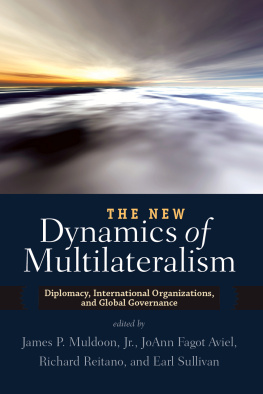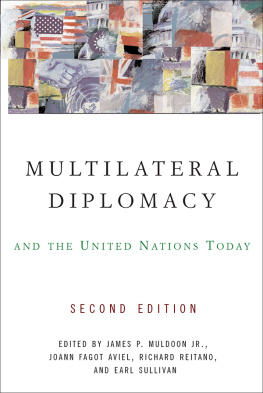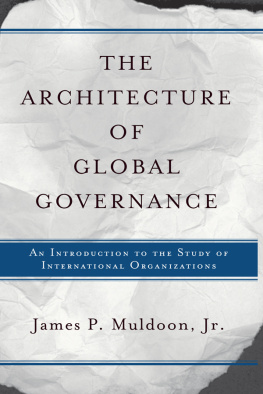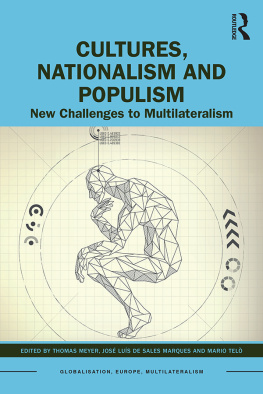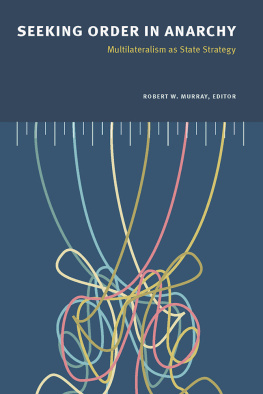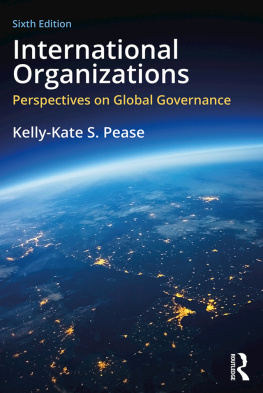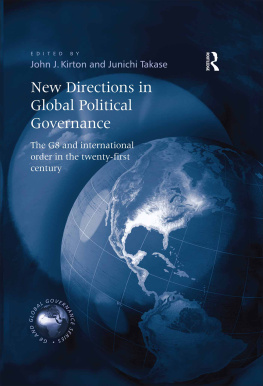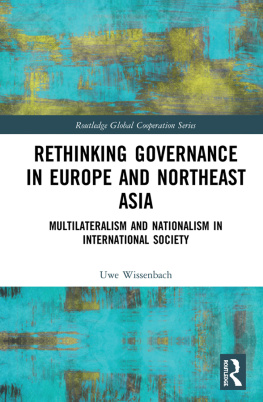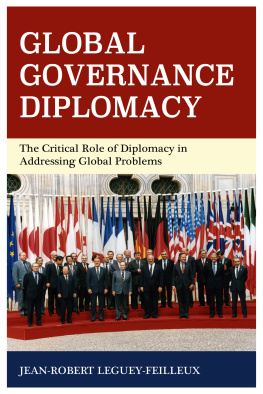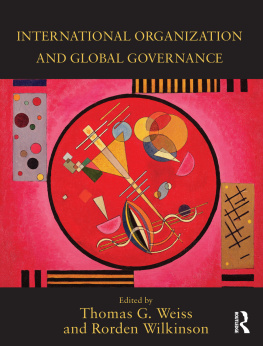THE NEW
Dynamics of
Multilateralism
THE NEW
Dynamics of
Multilateralism
DIPLOMACY, INTERNATIONAL ORGANIZATIONS, AND GLOBAL GOVERNANCE
James P. Muldoon, Jr.
JoAnn Fagot Aviel
Richard Reitano
Earl Sullivan
First published 2011 by Westview Press
Published 2018 by Routledge
711 Third Avenue, New York, NY 10017, USA
2 Park Square, Milton Park, Abingdon, Oxon OX14 4RN
Routledge is an imprint of the Taylor & Francis Group, an informa business
Copyright 2011 Taylor & Francis
All rights reserved. No part of this book may be reprinted or reproduced or utilised in any form or by any electronic, mechanical, or other means, now known or hereafter invented, including photocopying and recording, or in any information storage or retrieval system, without permission in writing from the publishers.
Notice:
Product or corporate names may be trademarks or registered trademarks, and are used only for identification and explanation without intent to infringe.
Every effort has been made to secure required permissions to use all images, maps, and other art included in this volume.
Designed by Pauline Brown
Typeset in 10.5 point Garamond
Library of Congress Cataloging-in-Publication Data
The new dynamics of multilateralism : diplomacy, international organizations, and global governance / James P. Muldoon [et al.].
p. cm.
Includes bibliographical references and index.
ISBN 978-0-8133-4481-2 (alk. paper)
1. Diplomacy. 2. International organization. 3. International relations. I. Muldoon, James P.
JZ1305.N46 2010
327dc22
2010015112
ISBN 13: 978-0-8133-4481-2 (pbk)
Contents
James P. Muldoon, Jr.
Geoffrey Wiseman
Michael G. Schechter
Andreas Kruck and Volker Rittberger
Richard Reitano
Joseph H. Melrose and J. Andrew Melrose
Stephen R. Rock
Donna M. Schlagheck
David A. Kennett
Timothy Longman and Natalie Zhringer
JoAnn Fagot Aviel
Peter D. Bell and Sherine S. Jayawickrama
Carroll Bogert
Stanley W. Burgiel
Stephen Jordan and Taryn Bird
Joan E. Spero
Earl Sullivan
John Mathiason
Ramesh Thakur
Henk-Jan Brinkman and Masood Hyder
Earl Sullivan
JoAnn Fagot Aviel
Richard Reitano
James P. Muldoon, Jr.
Increasingly, the term multilateralism seems to be popping up everywhereon talk radio and television, in newspapers and magazines, on blogs and even YouTubeas a way to describe the foreign policy of a country or international cooperation, generally. This is rather amazing when one considers how rarely the word was uttered in previous years outside the world of think tanks, foreign policy wonks, international affairs specialists, and international relations scholars. But multilateralism is much more than a mere description of foreign policy, diplomacy, or international cooperation. The concept encompasses an array of global issues, actors, and processes that make up the international system and refers to a particular approach to organizing and managing the complex relationships and interactions on the international level. For those of us who have long been engaged in the subject, the surge of interest in multilateralism has created some exciting opportunities to reach a wider audience for our work and to collaborate with a variety of scholars and practitioners in international relations and other academic disciplines. This has certainly been the case for us.
This book is the culmination of over a decade of collaborations to create classroom materials on the multilateral aspects of contemporary international relations that were both useful and accessible for university students, starting with the publication of Multilateral Diplomacy and the United Nations Today in 1998, followed by a second edition in 2005. The impetus for this undertaking has remained consistent throughoutclosing what we called a reality gap where students understanding of the intricate and often confusing methods and processes of multilateral diplomacy and international politics lags behind their grasp of the issues and problems on the global agenda. We concluded that what was missing was a practitioners perspective on the ins and outs of multilateral diplomacyhow it is conducted and how it has adjusted and performed in the postCold War political and economic climate of the United Nations system. We believe our approach of combining the perspectives of academics and practitioners has made a difference and revealed the nuances of multilateral diplomacy at the United Nations. This volume carries forward this framework to an examination of the more general notion of multilateralism and the practical dimensions of the increasingly complex realities of the global condition in the twenty-first century. In other words, it focuses on the dynamics of global politics as they relate to todays global issues, international institutions, and global governance.
The book is organized into five parts. The first provides brief accounts of the history and evolution of multilateralism within three academic fieldsdiplomacy studies, international organizations, and global governance. Parts 2 through 4 concentrate on the role of three key groups of actorsstates, nonstate actors, and the secretariats of international organizations, respectivelyin multilateral diplomacy and global governance. Each of these parts includes contributions from both scholars and practitioners, who examine the particular role of an actor and the effects of that role as it changes on the international system and global issues and problems. The final part of the book contains our reflections on the current state of multilateralism and the implications of its complex dynamics for the international system and global governance. This volume covers a wide range of subjects, including international peace and security, the global economy, human rights, the environment, humanitarian assistance, and economic development, which we hope will prove useful to students and scholars of international relations, to practitioners, and to interested members of the general public.
With multilateralism in vogue, this book comes out at a very propitious time. But it is also a very busy time for those actually involved in multilateral activities, including the contributors to this book, who took time from their extremely full schedules to join this enterprise. Obviously, this book would not have been possible without their participation, for which we are most grateful. And we remain indebted to our publisher, Westview Press, and especially to our editor, Anthony Wahl, for their unwavering support and sticking with us over all these years.
James P. Muldoon, Jr.
JoAnn Fagot Aviel
Richard Reitano
Earl Sullivan
FEBRUARY 2010


